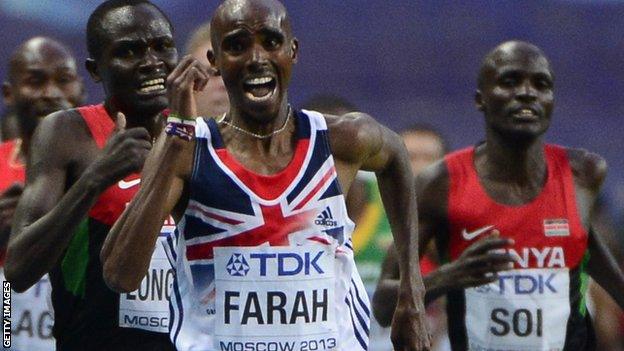Peerless Mo Farah dominating world distance running
- Published

Mo Farah is unquestionably the dominant force in world distance running today.
His 5,000 metres victory in Moscow was his second gold medal of these World Championships and the fifth global title of his career.
Having won the distance double at last year's London Olympics, he becomes only the second man in history after the great Kenenisa Bekele to win consecutive World and Olympic titles at 5,000 and 10,000 metres.
Sebastian Coe said ahead of the race that a win for Farah would make him peerless in British athletics history. Paula Radcliffe drew comparisons with the legendary Czech runner Emile Zatopek, who won the 5,000 and 10,000 metres and the marathon at the 1952 Olympics.
But while Farah's extraordinary winning streak has earned him a place in the pantheon of great distance runners, his winning times suggest he is still some way short of the greatest.
Remarkably, he is only the 31st fastest of all time over 5,000 metres, while there are 14 men who have run faster over 10,000.
This is no vintage era for distance running and Bekele's world records at 5,000 and 10,000 metres look well out of Farah's reach for now.
From next year the Somalia-born Londoner will make the step up to the marathon.
This may give us a more accurate measure of his talent. For some time now there has been a school of thought in athletics that the best runners shun the track for the roads, knowing there is much more money on offer in the big city marathons.
Combining the extra demands that come with running 26.2 miles and a young family will be a big test for the 30-year-old.
For now, all that can wait. By landing the distance 'double double' he has already matched, if not bettered, other British greats such as Coe, Daley Thompson and Jonathan Edwards.
But they broke world records as well as won titles. If Farah can do that, then the debate about whether he is the greatest British athlete of all time will be well and truly over.
- Published16 August 2013
- Published16 August 2013
- Published16 August 2013
- Published10 August 2013
- Published11 August 2013